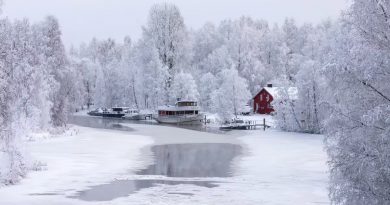Northwest Alaska villagers concerned about dead salmon washing up along Kobuk River

For the last week, from Shugnak all the way down to Kotzebue, people are reporting dead fish washed up on the banks of Northwest Alaska’s Kobuk River in astonishing numbers.
The fish appear to have been healthy and unspawned. Some have mysterious white welts dotting their backs.
Carolyn Ballot, mayor of Ambler, said when she first heard about the fish, she suspected bears were pulling salmon out of the water, which is nothing unusual. But the huge number of fish washing ashore quickly became concerning. She wondered whether warm weather in the region was causing the die-off.
“There is something going on,” she said.
Fish clogging the waterway?
The explanation may be somewhat mundane, though: The Alaska Department of Fish and Game suspects the die-off is related to this year’s extremely strong chum salmon run, to the point that the fish are practically clogging the waterway.
“It’s one of the greatest runs of all of time,” said Jim Menard, Alaska Department of Fish and Game area management commercial fisheries biologist for the Kotzebue and Norton Sound region.
Menard said with so many salmon choking the river there is “low dissolved oxygen” in the water, likely the cause of the die-off. Some fish are being pushed into the shallows, Menard said, where the water is warmer and less oxygen-rich.
Menard said being in the shallows also exposes the fish to more sunlight, which could be causing the welts — essentially fish sunburn, he said.
He noted the assessment is preliminary, and the department is still looking into the cause of the die-off. Menard said the U.S. Fish and Wildlife Service is heading to the river this week to conduct tissue sampling of the fish. He added there have been reports of other species of fish also dying — albeit in smaller numbers — and it appears the die-off is not an infection.
Exceeding pre-season estimates
The 2014 chum fishery on the Kobuk is one of the strongest ever. The commercial fishery in Kotzebue alone has caught over 600,000 fish, far exceeding pre-season estimates of no more than 275,000. Menard said Fish and Game estimates the catch is 50 percent higher than the record catch of last year.
There are so many fish in the river, people can see fins near the banks, according to Kiana resident Thomas Jackson. That never happens, he said, since the fish usually move through the deep river channels.
Last week, Jackson went fishing for whitefish at the Coal Mine Camp on the Kobuk, 20 miles upriver from Kiana. When he got there, he said, elders warned him that all he was going to catch were dead chums. He suspected he had missed the run, since on his trip up the river he’d seen only a few dead fish.
But when he hauled in his seine net after only a few minutes of fishing, he was shocked to find 50 dead salmon in it.
“I’m 51 years old and I’ve never seen this in my whole life,” Jackson said from Kiana Monday.
He said the fish have started to wash up in the village of Kiana, an Inupiat community of about 400 at the confluence of the Kobuk and Squirrel rivers. He wasn’t sure how many fish were on the shore, but it was starting to stink.
“If it’s starting to smell, it’s a lot of fish,” he said.
Contact Suzanna Caldwell at suzanna@alaskadispatch.com or on Google+
Related stories from around the North:
Canada: Is a fishing boom in the Arctic a sure thing?, Eye on the Arctic
Finland: Fishing-net death toll of endangered seals continues to rise in Finland, Yle News
Greenland: Greenland meeting to discuss Arctic fishing, Radio Canada International
United States: Fishing go-ahead on Alaska River, Alaska Dispatch




Fukushima